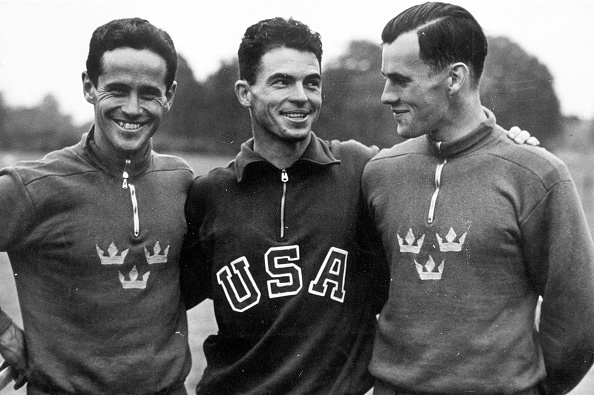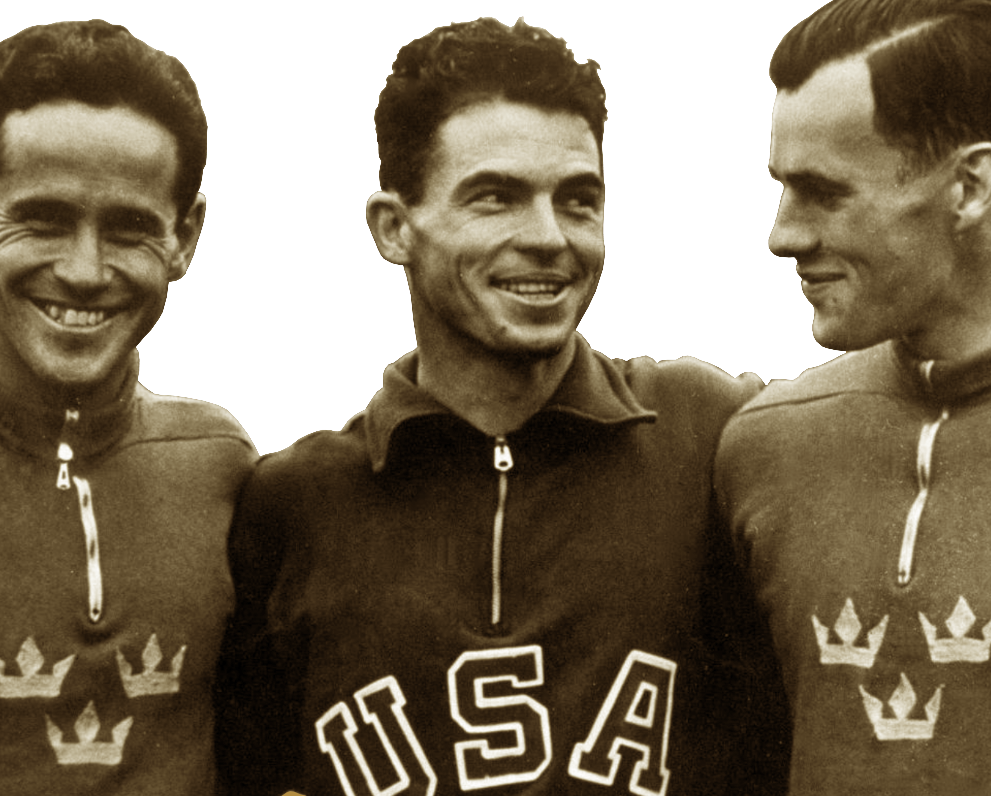

Modern pentathlon silver medalist Biss Moore ’37 P’69 ’71 is flanked by Swedish gold medal winner Wiliam Grut and fellow Swede bronze medal winner Gosta Gardin at the 1948 Olympic Games in London.
Lawrenceville’s Summer Olympians: George Bissland Moore, Class of 1937, P’69 ’71
George Bissland “Biss” Moore ended Lawrenceville's four-decade drought with a silver-medal performance in the modern pentathlon in the 1948 London Games.
After James Rector’s flirtation with gold in London in 1908, it would be forty years before Lawrenceville was once again represented in the Summer Olympics. George Bissland “Biss” Moore ended the four-decade drought with a silver-medal performance in 1948.
After the Summer Games were halted by World War II in 1940 and ’44, London was chosen to host the games on short notice. The 1948 games were the first to be shown on television, though most homes did not yet own this new technology. The modern pentathlon, in which Moore competed, was introduced to the Olympics in 1912. In it, athletes earn points for their performances across a range of events that includes fencing with epée, swimming a 300-meter freestyle race (this distance was shortened to 200 meter in 2000), show-jumping on a horse previously unknown to the rider, a shooting discipline with a 4.5 mm air pistol, and (in Moore’s day) a 4 km cross-country race.
The event places a premium on a broad range of athletic skills, but Moore, who was a successful track-and-field athlete at the United States Military Academy at West Point following his graduation from Lawrenceville, was up for the challenge. He was at the top of his game despite being injured in World War II, for which he earned a Purple Heart, two Bronze Star Medals, and the Legion of Merit serving in the First Armored Division. Moore had little time to train, as the U.S. Olympic Committee looked to the military for physically fit competitors after the war. In fact, Moore had to borrow a horse from a nearby veterinarian in order to train for the show-jumping segment of the event.
Despite a thermometer hovering in the 90s throughout the London games, Moore competed hard for the gold before succumbing to William Grut of Sweden.
Moore’s versatile athleticism was no surprise to those who recalled his talents at Lawrenceville. The 1937 Olla Podrida imagined a recipe for the ideal, all-around student-athlete represented by Moore: “Take the School’s leading scholar. Add to this the brainy, dependable halfback of the varsity football team. Dash an ace boxer and a track letterman into this mixture. Then flavor the whole with a winning personality and a fine character. After mixing evenly, you have 140 pounds of grey [sic] matter and muscle, Biss Moore.”
After the Olympics, Moore returned to West Point to teach English, part of a long Army career that saw him achieve the rank of colonel. Afterward, he moved on to business, working in operations research with Philco-Ford until 1967, when he returned to Lawrenceville as assistant treasurer. He was named business manager two years later. Moore’s association with the U.S. Olympic Modern Day Pentathlon team continued, too, when he was named its coach for the 1972 Summer Games in Munich.
Not long before Moore’s death in 2014, his daughter, Kimberly Moore Pressler, and his longtime friend and fellow West Point alum Col. David Schorr H’65 ’88 ’97 ’98 ’00 ’02 P’80 ’82 ’88 GP’97 ’09 ’12 ’17 agreed that Biss Moore’s Olympic medal should be willed to Lawrenceville. His silver medal and collection of Olympic photographs and memorabilia were displayed in the office of the old Lavino Field House.
A version of this story appeared in the summer 2016 issue of The Lawrentian.
